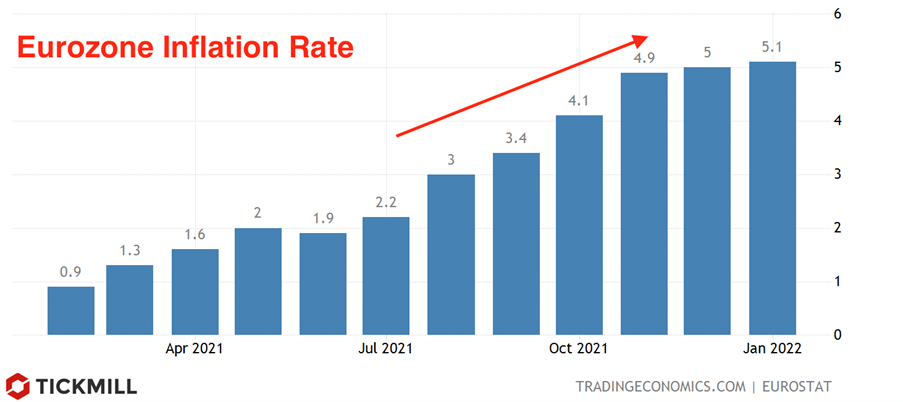Rising EU Inflation Unlikely to Force ECB to Change its Mind

The rise in prices in the Eurozone once again surprised, primarily due to an increase in energy prices, but there are few qualitative positive changes. Core inflation, on the other hand, eased from 0.4% to 0.3%, indicating that a "second round" of inflationary effects, which could really make the ECB worry, has not emerged. The chances that the ECB will disappoint tomorrow appears to be rising.
Headline inflation advanced to 5.1%, beating expectations:

Looking at the energy component in the EU inflation report, the annual growth was 28.6%. The question is whether firms will pass these costs on to consumers. So far, judging by the data, one month is not enough: commodity inflation fell to 2.3%, while inflation in the service sector remained at the same level - 2.4%.
The ECB predicts that inflation will slow down to 2% by the end of the year, and so far it cannot be said that the trend in inflation somehow threatens the realization of this forecast.
Expectations for GDP and inflation in 2023 and 2024 are improving and this should be enough for the ECB to raise rates in early 2023, but the situation with EU price increases is much less tense than in the US, where a second round of inflationary effects has already played out due to strong wage pressure, which in turn arose due to the increased rotation of the workforce during the pandemic (higher layoff rates = higher labor supply and demand imbalance during the recovery period).
Today the markets will be focused on the ADP report on the change in US employment. The consensus suggests a significant slowdown from 800K in December to 207K in January. ADP weakly predicts the NFP report and given that the markets do not set high expectations for the official report on the labor market, the report will not be able to influence the dollar much. Consolidation of DXY above 96.0 could likely signal a move into a dollar rally next week.
Disclaimer: The material provided is for information purposes only and should not be considered as investment advice. The views, information, or opinions expressed in the text belong solely to the author, and not to the author’s employer, organization, committee or other group or individual or company.
Past performance is not indicative of future results.
High Risk Warning: CFDs are complex instruments and come with a high risk of losing money rapidly due to leverage. 72% and 73% of retail investor accounts lose money when trading CFDs with Tickmill UK Ltd and Tickmill Europe Ltd respectively. You should consider whether you understand how CFDs work and whether you can afford to take the high risk of losing your money.
Futures and Options: Trading futures and options on margin carries a high degree of risk and may result in losses exceeding your initial investment. These products are not suitable for all investors. Ensure you fully understand the risks and take appropriate care to manage your risk.
